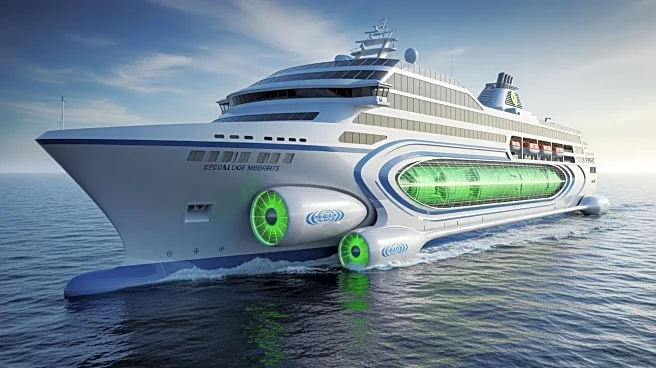What's Happening?
Cleaner-fuel burning ships accounted for 37% of cargo vessel orders in the first 10 months of 2025, unchanged from the previous year, according to data from AXSMarine. Despite a decrease in overall gross
tonnage ordered, the maritime industry remains committed to reducing emissions. However, uncertainty has increased following the postponement of the IMO's Net-Zero Framework vote, influenced by delegates from the United States and Saudi Arabia. This delay has led to a 'wait-and-see' approach among buyers regarding future ordering. Major container shipping lines like Maersk and Hapag-Lloyd continue efforts to cut carbon emissions, with more than 70% of capacity ordered by container ship and vehicle carrier operators being alternative-fuel capable.
Why It's Important?
Maritime shipping transports about 80% of global trade and accounts for approximately 3% of climate-warming greenhouse gases. The industry's commitment to less polluting ships is crucial for reducing its environmental impact. The delay in setting global carbon-reduction targets by the IMO creates uncertainty, potentially affecting future investments in cleaner technologies. However, the continued interest in alternative fuels, such as liquefied natural gas, methanol, and ammonia, indicates a shift towards more sustainable practices. This transition is essential for meeting international climate goals and reducing the industry's carbon footprint.
What's Next?
With the IMO's decision postponed, the maritime industry faces a period of uncertainty regarding regulatory frameworks for emissions reduction. Companies may adopt a cautious approach to new orders until clearer guidelines are established. Meanwhile, shipping lines are likely to continue investing in alternative fuels and technologies to maintain competitiveness and align with environmental standards. The industry's response to these challenges will be critical in shaping its future sustainability and regulatory compliance.
Beyond the Headlines
The shift towards less polluting ships reflects broader trends in the maritime industry towards sustainability and environmental responsibility. As global trade continues to grow, the industry's ability to adapt to new technologies and regulations will be vital in reducing its environmental impact. The delay in the IMO's decision highlights the complexities of international regulatory processes and the influence of geopolitical factors on environmental policy. This situation underscores the need for coordinated global efforts to address climate change and promote sustainable practices across industries.











